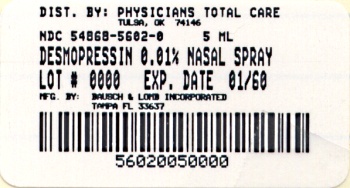Desmopressin Acetate Solution while Breastfeeding

What is Desmopressin Acetate Solution used for?
I am breastfeeding mother and I am using Desmopressin Acetate Solution. Can it have any bad effect on my kid? Shall I search for better alternative?

Nursing Mothers: There have been no controlled studies in nursing mothers. A single study in a postpartum woman demonstrated a marked change in plasma, but little if any change in assayable desmopressin acetate in breast milk following an intranasal dose of 10 μg. It is not known whether this drug is excreted in human milk. Because many drugs are excreted in human milk, caution should be exercised when desmopressin acetate is administered to a nursing woman.
Desmopressin Acetate Solution Breastfeeding Analsys
Desmopressin acetate while Breastfeeding
SafeCAS Number: 16679-58-6
It is structurally analogue to the naturally occurring anti-diuretic vasopressin hormone.
Desmopressin Acetate Solution Breastfeeding Analsys - 2
Desmopressin acetate while Breastfeeding
CAS Number: 16679-58-6
Desmopressin from a nasal spray is excreted in negligible amounts into milk and is poorly absorbed orally by the infant, so it appears acceptable to use during breastfeeding. There is no published experience with sublingual desmopressin during breastfeeding. Until more data become available, sublingual desmopressin should be used with caution during breastfeeding, especially while nursing a newborn or preterm infant.
What if I already have used Desmopressin Acetate Solution?
It is always a good idea to keep your healthcare provider or doctor informed about your drug usage during pregnancy and breastfeeding but if you have not informed your doctor about Desmopressin Acetate Solution and have used it then do not panic as Desmopressin Acetate Solution is mostly safe in breastfeeding and should not cause any harm to your baby.
I am nursing mother and my doctor has suggested me to use Desmopressin Acetate Solution, is it safe?
Definitely, Desmopressin Acetate Solution is safe in lactation for baby. No wonder your doctor has recommended it.
If I am using Desmopressin Acetate Solution, will my baby need extra monitoring?
No extra baby monitoring required while mother is using Desmopressin Acetate Solution
Who can I talk to if I have questions about usage of Desmopressin Acetate Solution in breastfeeding?
US
National Womens Health and Breastfeeding Helpline: 800-994-9662 (TDD 888-220-5446) 9 a.m. and 6 p.m. ET, Monday through Friday
UK
National Breastfeeding Helpline: 0300-100-0212 9.30am to 9.30pm, daily
Association of Breastfeeding Mothers: 0300-330-5453
La Leche League: 0345-120-2918
The Breastfeeding Network supporter line in Bengali and Sylheti: 0300-456-2421
National Childbirth Trust (NCT): 0300-330-0700
Australia
National Breastfeeding Helpline: 1800-686-268 24 hours a day, 7 days a week
Canada
Telehealth Ontario for breastfeeding: 1-866-797-0000 24 hours a day, 7 days a week
